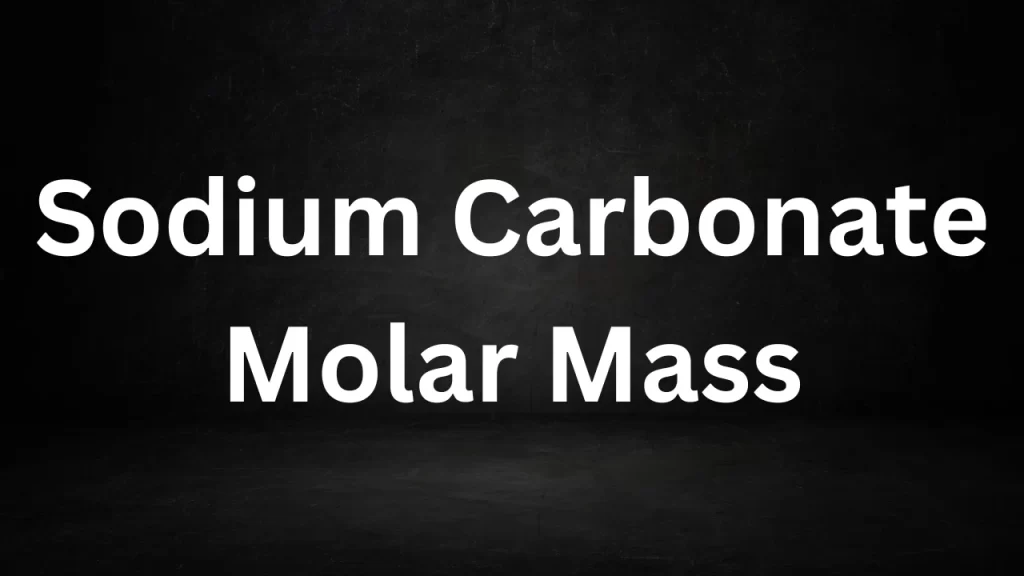Tag: molar mass of anhydrous sodium carbonate
Sodium Carbonate Molar Mass
Sodium Carbonate Molar Mass: Unveiling the Molecular Weight of Na2CO3 Molar mass, also known as molecular weight, is a fundamental concept in chemistry that plays a pivotal role in understanding and quantifying chemical reactions. In this article, we delve into the world of sodium carbonate (Na2CO3), a compound of significant importance in various industrial, scientific, and everyday applications, to explore its molar mass and its relevance in the realm of chemistry.

Sodium Carbonate Molar Mass
What is Molar Mass?
Molar mass is the mass of a substance expressed in grams per mole (g/mol). It represents the weight of one mole of that substance, where a mole is a unit that contains approximately 6.022 x 10^23 particles, be they atoms, molecules, ions, or any other entity. Molar mass is crucial in chemistry because it helps determine the quantity of a substance involved in a chemical reaction, making it an essential tool for stoichiometry and analytical chemistry.
Calculating the Molar Mass of Sodium Carbonate (Na2CO3)
To determine the molar mass of sodium carbonate (Na2CO3), we follow these steps:
1. Identify the elements: Sodium carbonate consists of three elements: sodium (Na), carbon (C), and oxygen (O).
2. Find the atomic masses: Consult the periodic table to find the atomic masses of each element.
- Atomic mass of Na ≈ 22.99 g/mol
- Atomic mass of C ≈ 12.01 g/mol
- Atomic mass of O ≈ 16.00 g/mol
3. Determine the number of atoms: In sodium carbonate, there are two sodium (Na) atoms, one carbon (C) atom, and three oxygen (O) atoms.
4. Multiply and sum: Calculate the molar mass by multiplying the atomic mass of each element by the number of atoms of that element in the compound and then summing these values.
- Molar Mass of Na2CO3 = (2 x Atomic Mass of Na) + (1 x Atomic Mass of C) + (3 x Atomic Mass of O)
- Molar Mass of Na2CO3 = (2 x 22.99 g/mol) + (1 x 12.01 g/mol) + (3 x 16.00 g/mol)
- Molar Mass of Na2CO3 ≈ 105.99 g/mol
Hence, the molar mass of sodium carbonate (Na2CO3) is approximately 105.99 grams per mole (g/mol).
Significance of Sodium Carbonate’s Molar Mass
Understanding the mol mass of sodium carbonate holds practical significance in several areas:
- Chemical Reactions: It is vital for determining the amount of sodium carbonate required or produced in chemical reactions, making it essential for proper dosing and yield estimation.
- Stoichiometry: Sodium carbonate’s molar mass plays a critical role in stoichiometric calculations, facilitating the precise relationship between reactants and products in chemical reactions.
- Industry Applications: Industries, including the detergent, glass, and chemical manufacturing sectors, rely on accurate molar mass values for process optimization and quality control.
- Analytical Chemistry: Mol mass information is invaluable in analytical techniques such as mass spectrometry, aiding in the identification and quantification of substances in samples.
- Household Uses: Sodium carbonate, commonly known as soda ash or washing soda, is used in various household applications, including cleaning, pH adjustment, and water softening.
To sum up, the mol mass of sodium carbonate is a fundamental factor in chemistry, allowing precise measurements and applications. In industry, research, or daily life, a solid grasp of molar mass calculations is crucial for accurate chemical analysis.
Read More
- Layers Of The Earth
- Environmental Pollution And Recycle
- Batteries In Series Parallel
- Difference Between Work And Energy
- Difference Between Concave Convex Lens
Frequently Asked Questions (FAQs) Sodium Carbonate Molar Mass
1. What is sodium carbonate, and why is its molar mass important?
Sodium carbonate, also known as soda ash or washing soda, is a chemical compound with the formula Na2CO3. Its molar mass is important because it allows us to calculate the amount of sodium carbonate in chemical reactions and solutions accurately.
2. How is the molar mass of sodium carbonate calculated?
- To find the mol mass of sodium carbonate (Na2CO3), sum the atomic masses of its elements: sodium (Na), carbon (C), and oxygen (O). The formula for calculating it is:
- Calculate the molar mass of Na2CO3 by adding: 2(Atomic Mass of Na) + Atomic Mass of C + 3(Atomic Mass of O).
3. What are the atomic masses of the elements in sodium carbonate?
- Atomic mass of Na (sodium) ≈ 22.99 grams per mole (g/mol)
- Atomic mass of C (carbon) ≈ 12.01 g/mol
- Atomic mass of O (oxygen) ≈ 16.00 g/mol
4. What is the molar mass of sodium carbonate (Na2CO3)?
The mol mass of sodium carbonate is approximately 105.99 g/mol.
5. Why is molar mass important in chemical reactions?
Molar mass is crucial for stoichiometry, a branch of chemistry that deals with the quantitative relationships between reactants and products in chemical reactions. It allows chemists to calculate the precise amounts of substances involved in reactions.